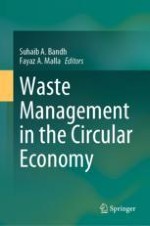2023 | OriginalPaper | Buchkapitel
4. Biodegradable Wastes in Bioeconomy
verfasst von : Dolores Hidalgo, Jesús M. Martín-Marroquín, Francisco Corona
Erschienen in: Waste Management in the Circular Economy
Aktivieren Sie unsere intelligente Suche, um passende Fachinhalte oder Patente zu finden.
Wählen Sie Textabschnitte aus um mit Künstlicher Intelligenz passenden Patente zu finden. powered by
Markieren Sie Textabschnitte, um KI-gestützt weitere passende Inhalte zu finden. powered by
